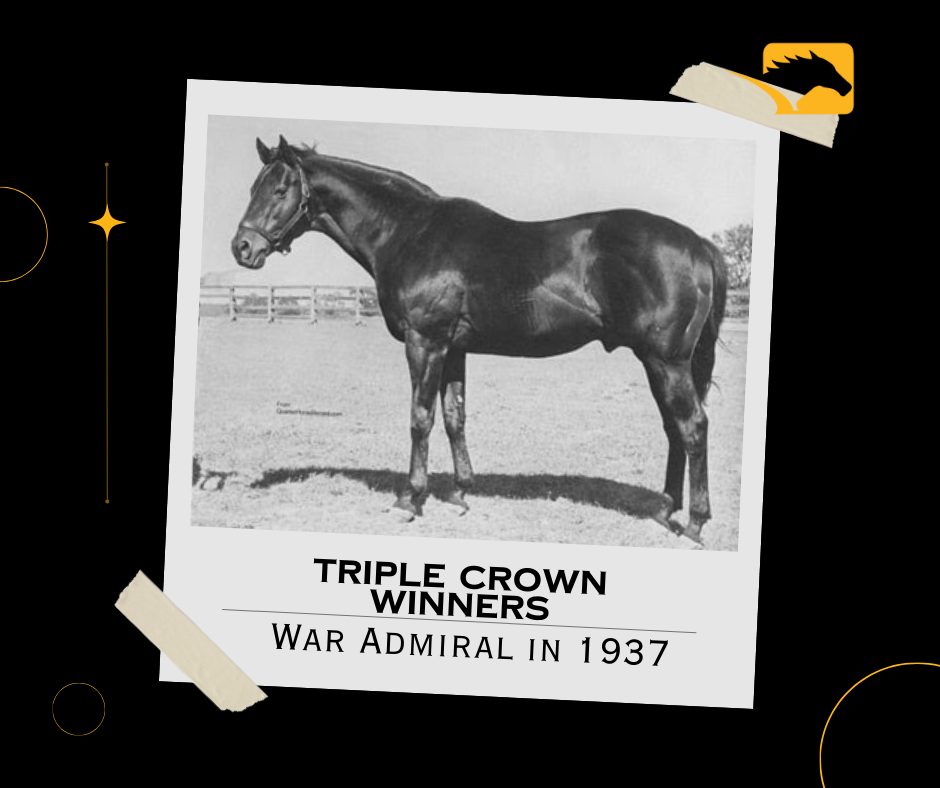Only a select few horses have achieved the Triple Crown throughout racing history. War Admiral is a paragon of equine excellence and tenacity among its distinguished victors. His conquest of the Triple Crown in 1937 solidified his place in equestrian lore. It provided a beacon of hope and entertainment during a period of economic struggle and societal change. This blog post delves into the storied legacy of War Admiral, exploring his pedigree, historical significance, and enduring impact on the culture and economy of his era.
Who Was War Admiral?
War Admiral was a thoroughbred racehorse whose name became synonymous with victory and grace. Born in 1934, he was the son of the legendary Man o’ War, one of the greatest racehorses in history, and Brushup, a mare with a distinguished lineage. With such a pedigree, expectations were high for War Admiral, and he did not disappoint, demonstrating early in his career that he possessed a fiery spirit and a will to win that mirrored that of his illustrious sire.
His Pedigree and History
War Admiral’s pedigree was a blend of speed and stamina, a legacy inherited from Man o’ War, who was renowned for his unparalleled dominance on the track. However, War Admiral was not merely a shadow of his father; he carved his path to glory, showcasing a unique combination of agility, speed, and tenacity. Trained by George Conway and owned by Samuel D. Riddle, War Admiral began his racing career with promise and quickly ascended to the pinnacle of American horse racing by capturing the Triple Crown in 1937, a feat that entailed winning the Kentucky Derby, the Preakness Stakes, and the Belmont Stakes.
His Legacy
The legacy of War Admiral extends beyond his victories on the track. In 1937, America was grappling with the lingering effects of the Great Depression, and the nation yearned for symbols of hope and resilience. War Admiral’s relentless spirit and remarkable achievements became a source of inspiration and entertainment for a society needing uplifting narratives.
War Admiral’s Triple Crown victory showcased his abilities and reflected the era’s culture and economy. Horse racing, one of the few sports that thrived during the Depression, offered an escape for people from the daily hardships of economic recovery. War Admiral’s triumphs brought joy and a sense of pride to a nation in search of heroes, elevating the stature of horse racing in American sports and culture.
Furthermore, his success contributed to the economy of the sport, drawing large crowds to racetracks and stimulating interest in horse breeding and racing. War Admiral’s victories in the Triple Crown races showcased the potential for greatness in American thoroughbred racing, inspiring future generations of breeders, trainers, and jockeys.
War Admiral’s legacy lives on in the annals of horse racing history and the breeding lines of many subsequent champions. His spirit, a blend of fierce competitiveness and graceful athleticism, continues to embody the essence of what it means to be a Triple Crown winner. Today, as we reflect on the impact of War Admiral’s career, we are reminded of the enduring connection between the achievements of equine athletes and their influence on the culture and economy of their times. In celebrating War Admiral, we commemorate an era, a sport, and an enduring legacy of excellence that transcends time.
Discover Excellence, Discover GoldMark Farm
Contact us to schedule a visit, discuss equine dry stall and paddock boarding for trainers and owners with 10 or more horses, learn more about our show cattle, or set up a tour of our Triple Crown Museum.
Do you want to stay at GoldMark Farm when you’re in Ocala? Learn more about our luxury apartment here. Learn more about our RV sites here.

0 Comments